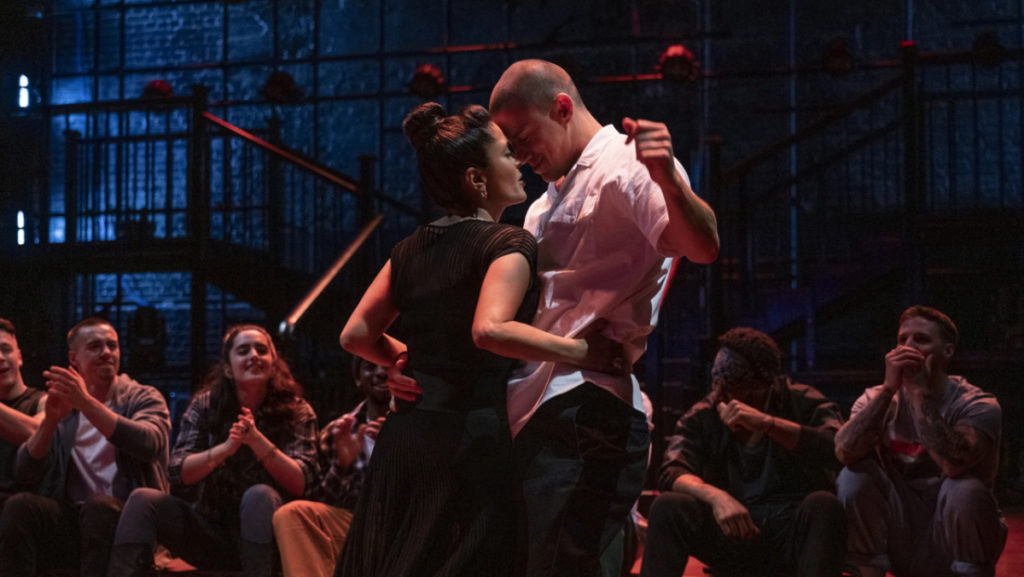“Magic Mike’s Last Dance” was probably made as a cash grab, marketing off the Magic Mike brand, well known and at least not hated by the general public. Channing Tatum is getting older, though not any less hot, and it seemed like a good time to get one last buck from his star-making physique before the producers couldn’t anymore.
The movie audiences get belies the likely money-milking origins. It’s a movie that manages to toe the line between ambition and pretension.
Maxandra Mendoza (Salma Hayek) calls on Mr. Magic himself (Tatum) to revolutionize British theater by turning a misogynistic old play into a spectacle of female pleasure.
This is meant to be a meta-critique of the “Magic Mike” series. These movies have always been about female pleasure, but more in the assumption of women delighting in male sexuality. As discussed in Tatum’s Vanity Fair interview in the lead-up to the film’s release, the women themselves were not of much concern, and Tatum seemed to want to rectify that. Now we have at least four different women and girls whose inner desires are explored and granted over the course of the story.
Repeated in the at-times unwelcome narration is the idea of the purpose of dance. It is an expression of joy and pleasure not found alone. Dance is a language that allows an honest connection and every scene is centered on this. These characters derive so much joy in these scenes from one another. They move and touch to express a giddiness that feels almost out of place today, not that the movie doesn’t acknowledge the tough realities facing most people post-quarantine. The movie gives Mike the background of having lost his last business in the lockdown. He and Maxandra meet while he’s working as a bartender, trying to earn enough to pay off his debts.
The main couple, Mike and Maxandra, are both awkward and incredibly in tune with one another. They slip into Spanish together for privacy around others and for intimacy when they’re alone. When they dance, there is no need for sight, just a focused, physical desire. Yet they don’t trust one another, not with their less-than-flattering feelings, no matter how true they are. Both want to live up to the other’s high image of them and feel ashamed of their own flaws. It’s a refreshing conflict: wanting to be the great version of oneself that their partner sees and feeling like any failure will make them a disappointment. They are both afraid the other will wake up and realize there are better options.
The assorted cast is fun and hot, as they should be in a Magic Mike film. The dancers, none of whom have lines, and all just share the names of their actors, bring a silent charisma to their scenes. They carry a physical comradery that shows even with a lack of distinct identities. Juliette Motamed brings a spark of energy as a punk emcee who acts as the voice of feminine desire in the play Mike puts on. Jemelia George plays Maxandra’s disillusioned daughter Zadie, whose investigation into the meaning of dance creates the film’s awkward narration. It’s a character that brings nothing new to the trope of a “neglected child unhappy with unreliable rich parents,” but she’s never resentful enough to be unreasonable or annoying.
As for what this series is known for — yes, the movie is hot. The dancers are spectacular, even from an asexual lens they are truly a sight to behold. The sexiness doesn’t just come from the idea of nice bodies grinding up on each other. There is a connection between each pair, no matter how casual, that adds a layer to each grind and hump. A considerable amount of weight is put on the erotic power of consent and submission.
Tatum has had plenty of success in comedy, but there are a lot of nuances in his deadpan performance of Mike that leaves the impression his talents are not appreciated enough. He plays the straight man to Hayek’s flighty producer, with all her passion and vision but lacking in Mike’s blue-collar discipline. Their comedic chemistry sells the movie in the interim of wet, half-naked men.
This is a film that wants its audience to feel good and feel no shame in that. It asks the audience to engage with it genuinely and leave behind everything but the most passionate part of oneself. More films with this kind of affection would be nice.




















